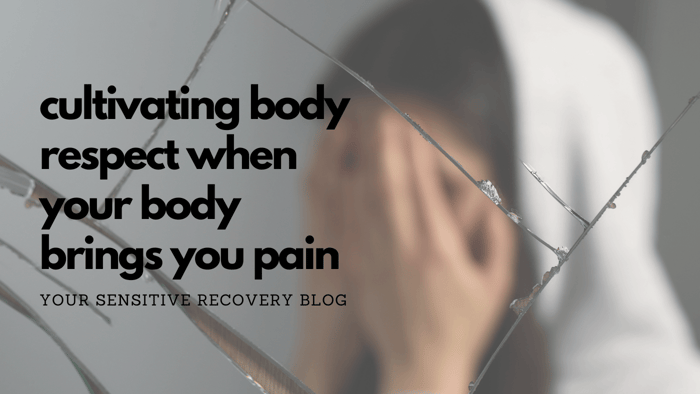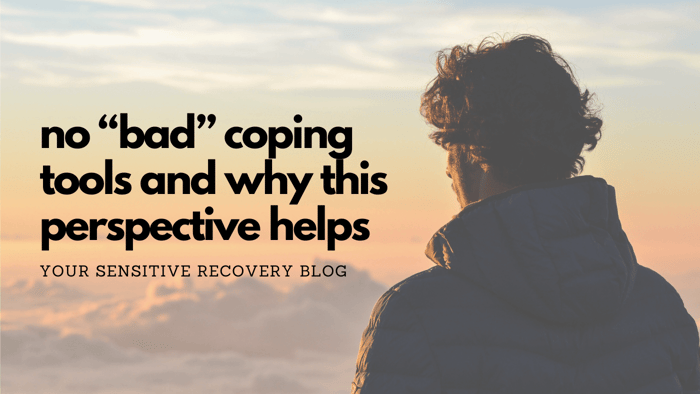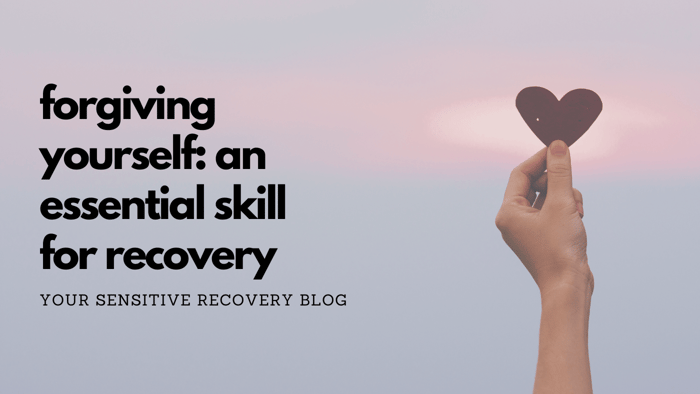Loving, or even liking your body, can feel out of reach for many people. It can be tough when it feels like your body has betrayed you, and brings you more pain than pleasure. Maybe you're living with chronic illness or a disability, and your body doesn't do the things it once could, or the things the world expects of it. Or maybe your pain stems from a history of trauma, body shaming, gender dysphoria, or a lifetime spent believing the way you look is more important than anything else about you. Whatever is at the root of the struggle, the idea of loving your body might feel like a stretch, to say the least. But what if the goal doesn't have to be love? What if you could begin by practicing Body Respect instead?
What is Body Respect?
Body Respect is about thoughtfully caring for your body, not because it looks a certain way, or even because it feels good, but because it is YOURS. It’s about meeting your body where it's at and offering it care, support, and dignity, even when it hurts - especially when it hurts.
Many of us have been sold the idea that we need to love our bodies to be mentally well, or to fully recover from an eating disorder or other bodily trauma.
But Body Love is not always accessible, especially when you're in pain, and when your body feels unfamiliar or untrustworthy.That’s why Body Respect can be a better path. Below are a few ways to begin cultivating Body Respect, even when your relationship with your body may feel complicated.
1. Redefine What Caring for Your Body Looks Like
Caring for your body doesn’t have to mean the same thing for everybody. And it certainly doesn't need to look like daily pilates, green smoothies, and sleep gummies (although that's all totally fine). Sometimes, caring for your body means taking your medication, saying "no," packing a snack in your bag, changing plans, using a mobility aid, bringing a heating pad to the office, or asking someone for help.
Body Respect is personal. It will look different for someone with chronic fatigue than it will for someone healing from disordered eating. There is no one-size-fits-all path. What matters is that you honor your body’s needs as they are, not as you wish they would be. Consider these questions:
- What does caring for your body look like?
- Is there a caring act you've been avoiding because you think you shouldn't need it?
- How can you give yourself permission to care for your body in ways that actually help?
2. Stop Measuring Your Worth by Your Body’s Output
Another really personal thing about Body Respect is you're body's capabilities and functions.
We live in a culture that overvalues nonstop productivity, the Thin Ideal, and "wellness." When your body can’t “perform” in the ways society deems acceptable, it’s easy to internalize the idea that you are broken, not enough, or too much.
Part of cultivating Body Respect means challenging these cultural norms. You are not your productivity. You are not your weight. You are not how well you function on any given day.
Your inherent worth is not up for measurement. It never changes, even when your body does.Start by noticing the ways you might tie your self-esteem to how much you “get done” or how “in control” your body feels. Can you begin to untangle from those ways?
3. Speak To (and About) Your Body Differently
The way we speak to ourselves matters. If your internal dialogue is filled with criticism, shaming, or blaming, it’s hard to cultivate respect, much less any helpful change you might be seeking.
Start by noticing your self-talk. If you catch yourself thinking or saying things you would never say to someone you love, something needs to shift. Get curious about where the thought is coming from. Whose voice is it? How does believing it or not affect your actions?
Please know that you don’t need to fake positivity or force gratitude that isn't there. You just need to stop the spiral of self-rejection and offer something softer, or maybe even just neutral, in its place. Try phrases like:
- “My body is doing the best it can.”
- “I deserve care, even when I’m struggling.”
- “It makes sense that I feel this way.”
- "I am working ot be kinder to my body."
4. Make Room for Grief and Compassion
Body Respect doesn’t mean you have to pretend everything is fine. Sometimes body respect begins with acknowledging grief: grief for what your body has been through, grief for what it's lost, or grief for what it never had the chance to have or do.
Maybe you grieve the years spent at war with food and your weight. Or the freedom you had before chronic pain took up residence in your nervous system. Or the childhood where you first learned your body was “wrong" or you needed to look or act differently to be safe, loved, or accepted.
This grief is real, and it deserves space. Let yourself feel it without judgment. And then, invite in compassion. Instead of demanding your body change, try asking:
- What does my body need today?
- What would be the kindest thing I could do for myself right now?
- What would I do for a friend in my shoes?
- If I can’t offer kindness, can I offer neutrality?
Compassion doesn’t mean denying your struggles or allowing yourself to wallow in them. Compassion is responding to them with care (which is actually quite proactive) rather than criticism.
Showing Up
Your relationship with your body might be layered, painful, or unresolved. That’s okay. Body Respect doesn’t require you to have it all figured out.
It simply asks you to show up for your body with consistency, compassion, and care, especially on the days that feel the hardest. It asks you to stop punishing yourself for things beyond your control, and to meet your body's needs, even when you don't want to.
You don’t have to love your body to treat it with dignity. You just have to believe that you’re worthy of care, even now.
Whether it's eating regularly, resting when you need to, setting boundaries, or simply choosing not to speak cruelly to yourself when you're struggling, that is body respect.
And you, as much as any other human, deserve it.
💕
✨ Josie Munroe, LMFT is a licensed therapist and owner of JosieMunroe.com and Your Sensitive Recovery. As a recovered clinician and Highly Sensitive Person, she loves supporting others on their journeys to form new, empowered relationships with food, their bodies, and their sensitivity. Join the newsletter for a weekly boost of hope and inspiration. You deserve a recovery that works for you! ✨





